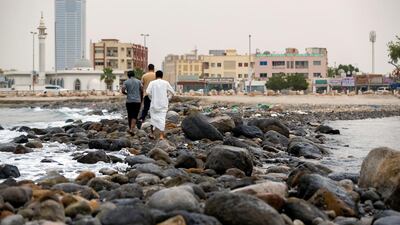Residents of Ras Al Khaimah say a government scheme to retrofit thousands of buildings to make them more energy efficient - and save them money on their utility bills - cannot come soon enough.
The plans, launched by the emirate’s municipality this week, aim to reduce electricity consumption by 30 per cent and water consumption by 20 per cent in 3,000 buildings by 2040.
It will initially focus on 300 government buildings but will later be extended to include 900 commercial properties and 1,800 residential.
Samah Ali, 35, said that refurbishing the three-bedroom flat she shares with her family would certainly decrease their energy usage.
She pays Dh1,500 utility bills each month - a huge sum which she said is partly down to the building not being airtight.
Cool air from the AC unit escapes easily and hot air enters.
“The windows at our apartment leaks hot wind from outside during the hot weather and that makes our AC work more and bring our utility bill high up,” said the Jordanian, who lives in Al Nakheel.
“I’m sure that a lot of apartments have the same issue and that definitely increases the uses of electricity,” she said.
“If this problem was fixed for ever it will surely help save energy and save us money.
“We installed water filters and reducers on showers and water taps to reduce the water consumption when we noticed that our water bill is a bit high and that help to reduce the usage.”
A real estate agent who lives in Al Uraibi said the retrofitting would encourage people to move to the emirate.
“No one likes to pay a lot of money on utilities and usually people ask about the utility bill average before moving in to a new apartment, so this is going to be an advantage if buildings become more sustainable with low bills,” said Karem Abdulqader, an Egyptian father of two.
“Old buildings don’t have any energy or water saving techniques. Even the simple ones such as water reducers or window film, which can be installed easily, can reduce energy expenditure and help them pay less,” said Mr Abdulqader.
A typical building retrofit could take anywhere between three and nine months to complete.
It is not yet known which residential areas will benefit but the municipality said they accepted that most private owners cannot afford to carry out the work themselves.
“The RAK municipality has already signed the first retrofit contract of the RAK government for three of our buildings,” said Munther Bin Shekar, director general of Ras Al Khaimah municipality department.
“Large commercial and hospitality buildings will be targeted for retrofits as a second step.
“For the residential sector, we will look at innovative approaches to minimise the financial burden of such projects on the building owners.”
Included in the retrofit programme will be air conditioning (AC) unit upgrades, increased roof insulation and the adoption of LED lighting.
Andrea Di Gregorio, director of energy efficiency and renewables at RAK municipality, said costs and timescales of each building would vary.
________________
Read more:
Leaky buildings: Residents see high energy prices living in UAE’s older flats and villas
Desire for signature buildings in UAE causing energy leaks, say experts
________________
“Projects which address replacement of equipment such as lighting or AC may last just a few months, while projects which affect the building envelope usually take longer,” he said.
“Depending on the size of the building and the type of energy efficiency measures that are adopted, cost of these projects can vary widely, and so do the energy savings that are realised.
“In general, we are looking for projects which allow recovery of the investment in a short period of time, ideally less than five years.”
Mr Bin Shekar said the retrofit programme would result in better quality buildings as well as lower energy and water bills for residents.

